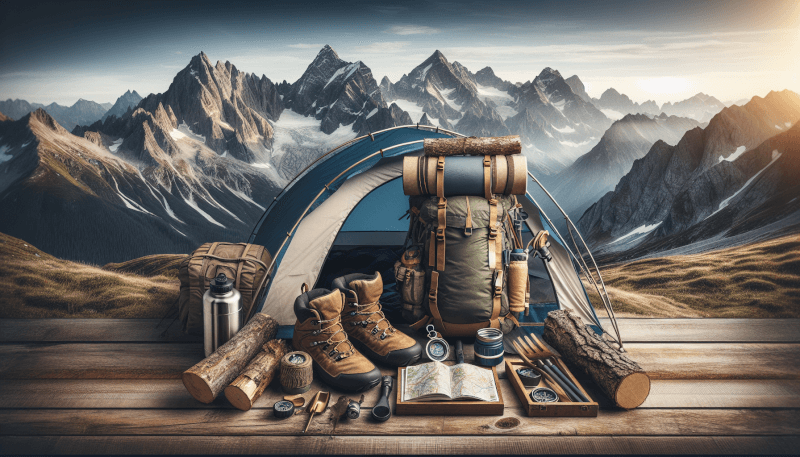Are you ready to embark on a camping adventure? Whether you are a seasoned camper or a first-timer, acquiring essential skills for a successful camping experience is key. From setting up a tent to building a campfire, this article will provide you with valuable tips and tricks to ensure that your outdoor excursion is both enjoyable and memorable. So grab your gear and get ready to learn the essential skills that will make your camping adventure a resounding success.

Choosing the Right Campsite
When planning a camping trip, one of the first things you should consider is the geographic location of your campsite. Whether you prefer a serene mountaintop or a picturesque lakeside, the location can greatly enhance your camping experience. Take into account the surroundings and the activities available in the area. Would you like to go hiking or fishing? Is there a nearby beach or trail? Choosing a campsite with the right geographic location will ensure you have ample opportunities for outdoor adventures.
Once you have narrowed down the location, it’s important to evaluate the amenities offered at the campsite. Some campsites provide amenities such as drinking water, bathrooms, picnic tables, and fire pits. These amenities can make your camping trip more convenient and enjoyable. However, keep in mind that more basic campsites can also offer a unique and immersive experience in nature. Consider your preferences and choose a campsite with amenities that align with your needs and desires.
In addition to location and amenities, accessibility is another crucial factor to consider when choosing a campsite. Evaluate how easily you can access the campsite, especially if you are camping with young children or individuals with mobility limitations. Check if there are clear trails or roads leading to the campsite and whether it requires a long hike or a short walk. By considering accessibility, you can ensure that everyone in your camping party can comfortably reach the campsite and fully enjoy the experience.
While exploring potential campsites, it is essential to check for safety measures. Look for campgrounds that have implemented safety protocols to protect campers from potential hazards. This can include fire safety measures, such as designated fire areas and fire extinguishers, as well as regulations regarding wildlife encounters. Choosing a campsite with safety measures in place will give you peace of mind and help you focus on enjoying your camping adventure.
Setting Up Camp
Once you have found the perfect campsite, it’s time to set up camp. Pitching a tent is an important skill to master for any camping trip. Make sure to choose a suitable spot that is flat and clear of any rocks or sharp objects. Lay out your tent and carefully follow the instructions to assemble it correctly. Ensure that the tent is securely staked to the ground and properly sealed to keep insects and rain out. Taking the time to pitch your tent properly will provide you with a comfortable and sheltered home away from home.
Building a safe campfire is another essential aspect of setting up camp. Before starting a fire, check if there are any fire restrictions in the area and familiarize yourself with local regulations. Clear a safe area by removing any flammable materials and surround the fire pit with rocks or a fire ring, if available. Use dry wood and kindling to start the fire, and never leave it unattended. Remember to fully extinguish the fire before leaving the campsite. A well-built and properly maintained campfire can provide warmth, light, and a cozy atmosphere during your camping trip.
Arranging cooking and food storage areas is crucial for a successful camping adventure. Designate a separate area for cooking to prevent any accidents or messes. Use a camping stove or a grill for cooking, if permitted, and ensure it is placed on a stable surface away from flammable materials. Set up a food storage area to keep your supplies safe from wildlife. Consider using bear-proof containers or hanging food from a tree, depending on the specific precautions recommended for the area. By properly organizing your cooking and food storage areas, you can ensure a smooth and enjoyable culinary experience in the great outdoors.
Creating comfortable sleeping arrangements is essential for a restful night’s sleep while camping. Invest in a high-quality sleeping bag and camping mat or air mattress to provide cushioning and insulation from the ground. Take into account the weather conditions and choose a sleeping bag with an appropriate temperature rating. Set up your sleeping area inside the tent, away from the walls, to minimize condensation. Organize your belongings and create a cozy and personalized space to relax and recharge after a day of outdoor activities.

Navigating the Outdoors
When venturing into the great outdoors, it is important to have the skills to navigate and stay on the right path. Reading maps and using a compass are essential skills to master before heading out on any outdoor adventure. Familiarize yourself with the symbols and markings on a map and learn how to interpret them accurately. Use a compass to find your bearings and orient yourself in relation to your surroundings. By having these skills, you can confidently explore new areas and ensure you never lose your way.
In addition to maps and compasses, it is helpful to learn how to identify landmarks and natural signs. Look for distinctive features such as rivers, mountains, or unique tree formations that can serve as reference points. Pay attention to animal tracks, bird calls, and other signs of wildlife that can provide valuable information about your location and the surrounding environment. By honing your observation skills, you can develop a deeper connection with nature and navigate the outdoors more effectively.
Understanding topography and elevation is crucial when planning hikes or other outdoor activities. Learn how to read contour lines on a map to determine the steepness of a slope and anticipate changes in elevation. This knowledge will help you gauge the difficulty level of a trail and plan accordingly. Take into account your fitness level, the distance to be covered, and the elevation gain to ensure a safe and enjoyable experience in the outdoors.
When exploring established trails, pay attention to trail markers and signs. These markers can guide you in the right direction and prevent you from getting lost. Look for brightly colored blazes on trees, cairns, or signposts that indicate the correct path. Familiarize yourself with the specific trail markings used in the area you are camping in. By following trail markers and signs, you can confidently navigate through unfamiliar terrain and fully immerse yourself in the beauty of nature.
Campfire Cooking
One of the joys of camping is cooking delicious meals over a campfire. To ensure a successful and enjoyable cooking experience, it is important to choose the right cooking equipment. Consider the type of meals you plan to prepare and select appropriate cooking utensils, pots, and pans. Invest in a sturdy and portable camping stove for convenient cooking, especially in areas where open fires are restricted. By choosing the right cooking equipment, you can prepare a variety of tasty meals and snacks while exploring the outdoors.
Building a cooking fire requires careful consideration of safety and efficiency. Start by selecting a suitable location for your cooking fire. Ensure that it is a safe distance from your tent and any flammable objects. Clear the area of any leaves or twigs and create a fire ring using rocks or a designated fire pit, if available. Gather dry firewood in different sizes to sustain the fire and adjust the heat. Once the fire has burned down to coals, you can place a grill or a pot directly over the heat for cooking. Building a cooking fire properly will provide you with a reliable and controlled heat source for all your culinary adventures.
When preparing your meals and snacks, always practice proper food safety and hygiene. Ensure that your hands are clean and use separate cutting boards and utensils for raw and cooked foods to avoid cross-contamination. Keep perishable foods refrigerated until you are ready to cook or eat them. Cook meat thoroughly and use a food thermometer to ensure proper internal temperatures. Promptly dispose of any leftover food scraps and wash dishes and utensils with hot soapy water. By following these practices, you can enjoy delicious and safe meals while camping in the great outdoors.

Finding and Purifying Water
When camping, finding a reliable water source is crucial for staying hydrated and preparing meals. Locating water sources may require some exploration. Look for natural water sources such as rivers, lakes, or streams. Pay attention to any signage that may indicate the quality and safety of the water. It is advisable to choose running water over stagnant water whenever possible. By identifying reliable water sources, you can ensure a steady supply of clean water during your camping adventure.
Before consuming any water found in the wild, it is essential to assess its quality. While natural water sources may appear pristine, they can still contain harmful bacteria, parasites, or other contaminants. Invest in a water filter or purification system to effectively remove these impurities. Alternatively, learn various methods of water purification, such as boiling, using water purification tablets, or employing ultraviolet light. By purifying the water, you can significantly reduce the risk of waterborne illnesses and enjoy a safe and refreshing drink in the wilderness.
In addition to purifying water, it is vital to know how to collect and store it properly. Use clean containers to gather water, ensuring they are free from chemical residue or contaminants. Store the collected water in sealed containers to prevent contamination from insects or dirt. If possible, try to reserve some water for emergencies or unexpected situations. By adopting these practices, you can have a reliable source of clean water throughout your camping trip.
First Aid and Safety
Being prepared for potential accidents or injuries is essential when camping in the outdoors. One of the first steps is to create a comprehensive first aid kit. Include essential items such as band-aids, sterile dressings, adhesive tape, antiseptic wipes, and pain relievers. Familiarize yourself with the contents of the kit and know how to use them effectively. It is also advisable to pack any specific medications or medical supplies that you or members of your camping party may require. By having a well-stocked first aid kit, you can quickly respond to minor injuries and ensure the safety of everyone involved.
In addition to having a first aid kit, it is important to develop basic first aid skills. Learn how to clean and dress wounds properly, perform CPR, and handle common outdoor injuries such as sprains or burns. Familiarize yourself with the signs and symptoms of more severe conditions, such as heat stroke or hypothermia, and know how to provide appropriate care. By acquiring these skills, you can confidently address medical emergencies during your camping adventure.
Identifying and treating common outdoor injuries is another crucial aspect of first aid and safety. Be aware of potential hazards such as cuts, insect bites, or sunburns, and take necessary precautions to prevent them. Additionally, know how to recognize and treat allergic reactions, heat-related illnesses, and animal or insect bites. By understanding these common outdoor injuries, you can effectively mitigate risks and ensure a safe and enjoyable camping experience.
Emergency communication and evacuation procedures are also vital for ensuring safety while camping. Familiarize yourself with the nearest emergency services and their contact information. Determine if there is cell phone reception in the area or if you need to rely on alternative communication methods, such as satellite phones or emergency beacons. Establish an emergency plan with your camping party and discuss actions to take in different scenarios. By being prepared and having clear communication and evacuation procedures in place, you can effectively respond to emergencies and keep everyone safe.

Wildlife Awareness and Safety
Encountering wildlife is often a memorable part of camping, but it is essential to approach these encounters with caution and respect. Recognizing common wildlife species in the area you are camping in is the first step. Research the native wildlife and learn about their behavior and habits. This knowledge will help you understand their natural tendencies and minimize the risk of dangerous encounters.
Understanding animal behavior is critical when camping in areas with wildlife. Avoid approaching or attempting to feed wild animals, as this can disrupt their natural behavior and potentially lead to dangerous situations. Store food securely to prevent attracting animals to your campsite. Remember that wild animals are unpredictable and should be observed from a safe distance. By respecting their space and keeping a safe distance, you can coexist peacefully with the wildlife around you.
Preventing wildlife encounters is essential for ensuring everyone’s safety. Store food and scented items in bear-proof containers or hang them from a tree, following the guidelines provided for the specific area. Keep your campsite clean and free from food scraps or trash that may attract wildlife. If you encounter aggressive or threatening wildlife, make loud noises, wave your arms, and slowly back away. By taking these precautions and being mindful of your surroundings, you can reduce the likelihood of wildlife encounters.
In the event that you do encounter wildlife, it is important to know how to respond appropriately. Remain calm and try to maintain eye contact with the animal, while slowly backing away. In the case of a bear or other large predators, make yourself appear larger by raising your arms and standing tall. Avoid turning your back or running, as it may trigger a chase response. By responding calmly and following these guidelines, you can minimize the risk of harm during a wildlife encounter.
Leave No Trace Principles
When enjoying the great outdoors, it is important to minimize your impact on the environment. Follow the principles of Leave No Trace to ensure that future campers and wildlife can also enjoy the natural beauty of the area. One of the fundamental principles is to minimize campsite impact. Choose established campsites whenever possible and avoid creating new ones. Set up your tents and campfires in areas that have already been impacted to minimize further disruption to the ecosystem.
Proper waste disposal is another crucial aspect of leaving no trace. Pack out all your trash and dispose of it properly in designated waste receptacles. If there are no trash facilities available, pack your trash out with you and dispose of it responsibly when you return to civilization. Avoid burying or burning trash, as it can be harmful to the environment and wildlife. By practicing responsible waste disposal, you can help protect the natural environment for future generations.
Responsible fire management is vital for preserving the wilderness. Before starting a fire, ensure that it is allowed in the area and follow all fire regulations. Use existing fire rings or designated fire pits whenever possible and never leave a fire unattended. Fully extinguish the fire before leaving the campsite, ensuring that it is cool to the touch and there are no embers left. By being responsible with fire, you can prevent wildfires and ensure the safety of yourself and others.
Respecting wildlife and vegetation is a key principle of Leave No Trace. Avoid picking flowers, cutting branches, or harming plants. Observe wildlife from a distance and avoid feeding or approaching them. Keep your pets on a leash and prevent them from disturbing or harming wildlife. By respecting the natural environment, you can contribute to its preservation and maintain the delicate balance of the ecosystem.

Emergency Preparedness
While camping is often a safe and enjoyable experience, it is important to be prepared for emergencies. Creating an emergency plan is essential for ensuring the safety of yourself and your camping party. Discuss potential scenarios and establish protocols for each situation. Determine emergency meeting points and communication methods to stay connected in case of separation or other unexpected events. By planning ahead, you can effectively coordinate actions and respond to emergencies more efficiently.
Knowing how to signal for help is crucial in emergency situations. Carry signaling devices such as whistles, mirrors, or flares, which can attract attention and alert others to your location. Learn distress signals and emergency codes that are commonly recognized by search and rescue teams. If cell phone reception is available, contact emergency services as soon as possible. By knowing how to signal for help, you can increase your chances of receiving assistance in a timely manner.
Understanding basic survival skills is essential for effectively managing unexpected situations. Learn how to build emergency shelters using natural materials or a survival blanket. Familiarize yourself with methods of finding and filtering water in case your supply runs out. Develop fire-starting skills using various techniques such as a firestarter or friction fire methods. Basic knowledge of these survival skills can make a significant difference in emergency situations and increase your chances of survival.
Preparing for inclement weather is crucial when camping in the outdoors. Check the weather forecast before your trip and pack appropriate clothing and gear. Bring waterproof tents, jackets, and footwear to stay dry during rain or snow. If a storm or severe weather is predicted, consider adjusting your plans and seeking shelter in a safe location. By planning for different weather conditions, you can ensure your comfort and safety throughout your camping adventure.
Outdoor Skills for Various Activities
Camping often presents opportunities for various outdoor activities. Whether you enjoy hiking, fishing, canoeing, or rock climbing, it is essential to acquire the necessary skills for each activity.
Hiking and backpacking require certain essentials to ensure a safe and enjoyable experience. Invest in a comfortable and supportive pair of hiking boots or shoes to protect your feet during long walks. Learn how to pack a backpack efficiently, distributing the weight evenly to avoid strain or discomfort. Familiarize yourself with hiking etiquette, staying on established trails and respecting the environment. By honing your hiking and backpacking skills, you can explore new territories and appreciate the beauty of nature on foot.
Fishing and hunting can be rewarding outdoor activities, but they require specific techniques and knowledge. Learn how to select the appropriate fishing gear, such as rods, reels, and bait, to increase your chances of success. Understand fishing regulations and obtain the necessary permits before casting your line. If you plan to hunt, ensure you are familiar with local laws and regulations. Learn proper firearm safety and practice ethical hunting methods. By acquiring these skills, you can fish or hunt responsibly and ethically while enjoying the tranquility of nature.
Canoeing and kayaking offer unique opportunities to explore bodies of water and witness breathtaking landscapes. Before embarking on a paddling adventure, learn basic paddling techniques and strokes to maneuver the boat efficiently. Familiarize yourself with the safety equipment required for each activity, such as life jackets or personal flotation devices. Understand the importance of water safety and always check tide charts, water conditions, and weather forecasts before heading out. By developing these skills, you can experience the tranquility of gliding through the water while ensuring your safety.
Rock climbing and rappelling require specialized skills and equipment. If you are new to these activities, consider taking lessons or hiring a guide to ensure safety and learn proper techniques. Familiarize yourself with the necessary safety gear, including helmets, harnesses, and ropes. Practice climbing knots and belaying techniques to ensure you and your climbing partner’s safety. Before attempting any climbs, thoroughly inspect the rocks for stability and potential hazards. By mastering these skills, you can safely enjoy the thrill and challenge of rock climbing and rappelling.
In conclusion, acquiring essential skills is crucial for a successful camping adventure. From choosing the right campsite to mastering outdoor activities, each aspect contributes to an enjoyable and safe experience in the great outdoors. By considering geographic location, evaluating campsite amenities, and prioritizing accessibility and safety measures, you can find the perfect campsite for your needs. Setting up camp properly, mastering outdoor navigation skills, and understanding campfire cooking techniques will ensure comfort and satisfaction during your trip. Additionally, knowing how to find and purify water, practicing first aid and safety protocols, and fostering wildlife awareness contribute to a responsible and harmonious camping experience. By adhering to Leave No Trace principles, preparing for emergencies, and acquiring outdoor skills for various activities, you can embark on a camping adventure filled with unforgettable memories and appreciation for the natural world.


